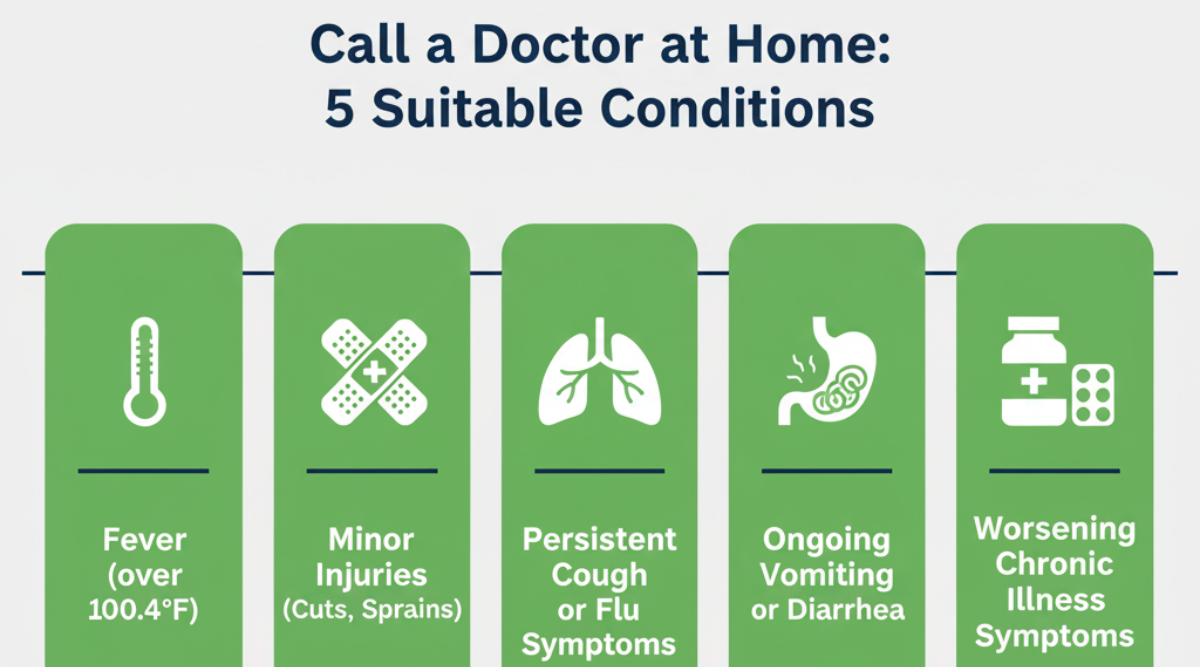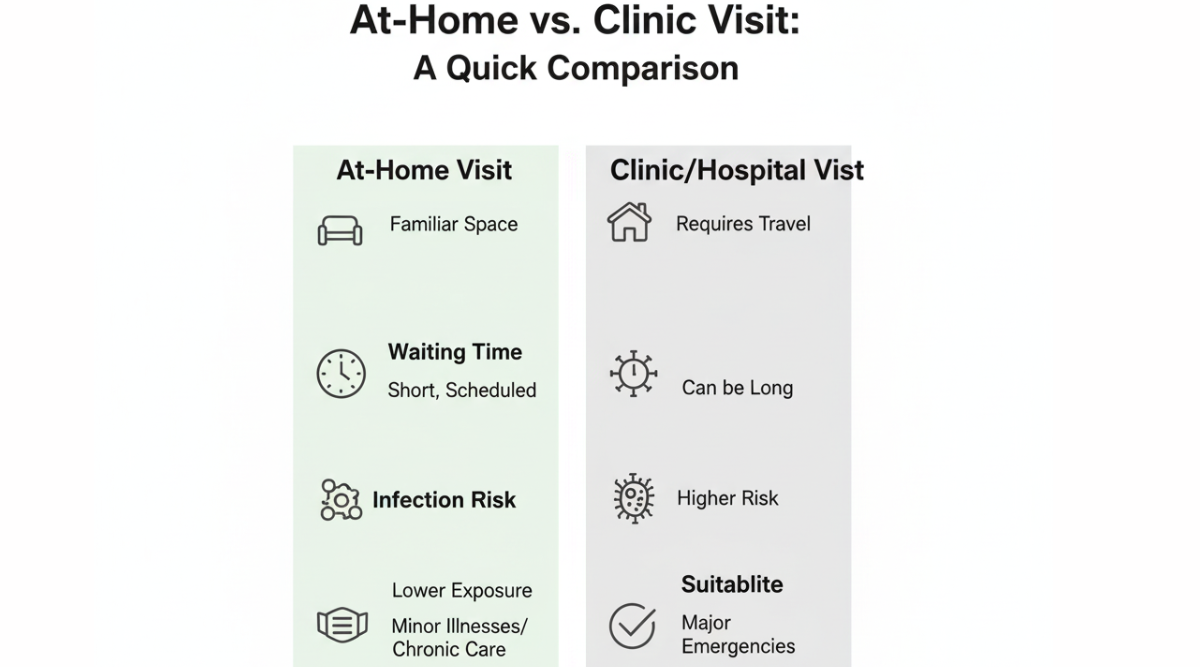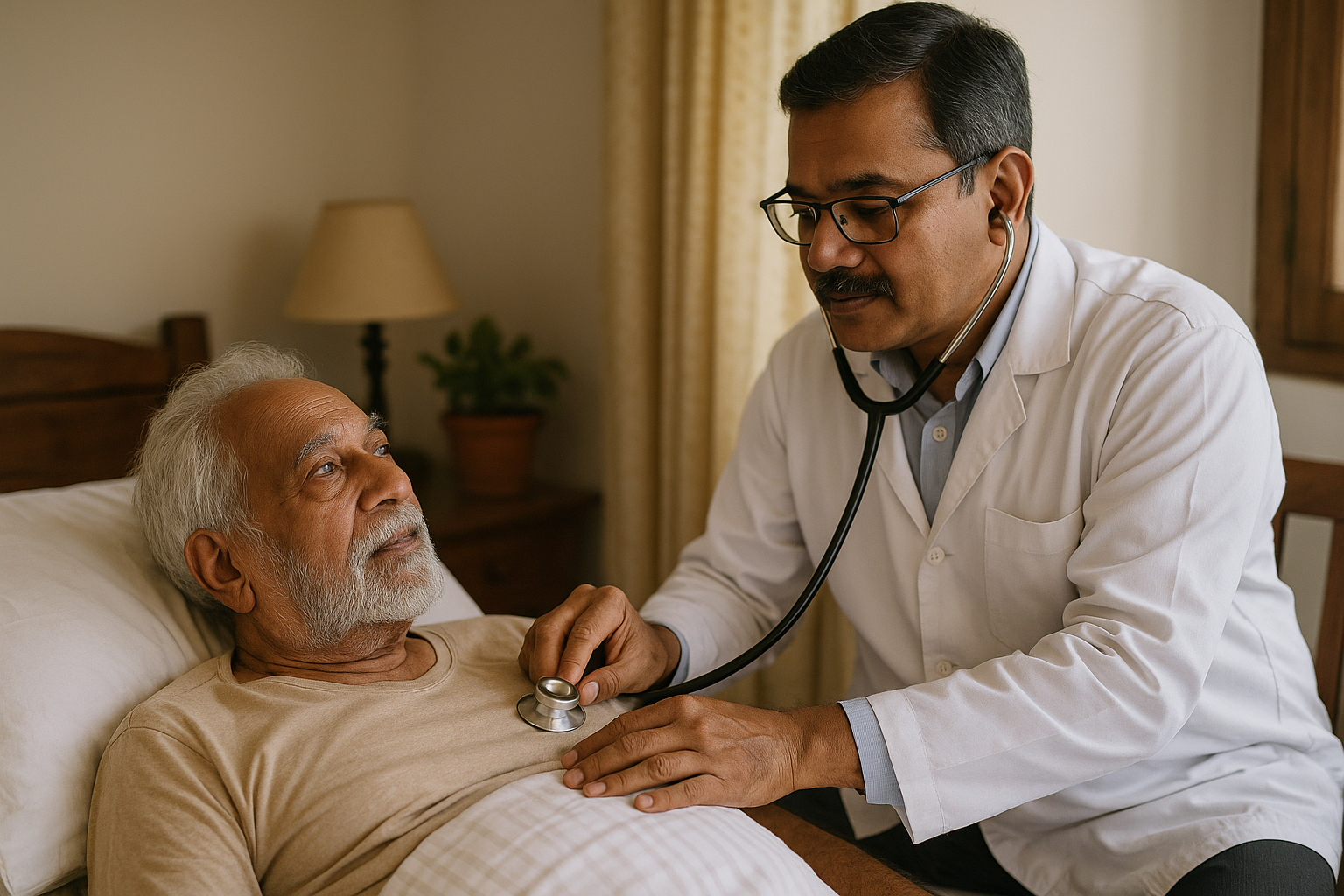Getting medical help at home saves time and stress. If you’re sick, worried, or caring for someone who struggles to travel, a home doctor visit brings skilled care to your door. For families, seniors, and anyone wanting expert help without leaving the house, Dr. Morepen Home offers trusted healthcare with comfort and safety in mind.
Recognizing When to Call a Doctor at Home
Urgent vs Non-Urgent Situations: What’s Suitable for Home Visits?
Not every health concern needs an emergency room. Many problems can be managed well with a home visit. High fevers, coughs that last, or mild difficulty breathing may be handled by a doctor who comes to you. Think about whether you need quick clinic action or if a professional can help with careful attention in your living room.

Common Symptoms Requiring Doctor Attention at Home
- Fever over 100.4°F (38°C) that won’t go down
- Sharp pain that is hard to ignore
- Ongoing vomiting or diarrhea
- Worsening symptoms for long-term illnesses
- Small wounds or burns
Call when someone’s condition troubles you, but does not put life at risk. A home doctor can decide if you need more testing or hospital care.
Red-Flag Signs You Shouldn’t Ignore
Some signs mean you must visit the hospital:
- Chest pain that doesn’t stop
- Trouble breathing quickly getting worse
- Sudden weakness or confusion
- Heavy bleeding or a seizure
In these cases, call emergency services. A home doctor cannot offer the treatments these problems need.
Common Health Conditions Treated in Home Visits
Fever, Respiratory Infections, and Flu Symptoms
Doctors who visit homes often treat colds, flu, and fevers. If you or someone you care for feels weak and finds it tough to travel, it’s best to ask for a doctor to come. They check your symptoms, advise on treatment, and make it easier to recover at home.
Minor Injuries: Cuts, Burns, Sprains
Accidents can happen anywhere - sometimes at home. A doctor can help by cleaning wounds, putting on dressings, suggesting pain relief, or stitching up minor cuts.
Digestive Issues: Vomiting, Diarrhea, Stomach Pain
If stomach problems make it hard to keep fluids down, calling a doctor home is wise. The doctor can figure out what’s wrong and guide you to the right medicines.
Allergic Reactions and Skin Rashes at Home
Skin troubles and mild allergies can be scary but may not always be serious. A home visit can help you know what to do, avoid hassles, and get fast relief.
Elderly and Chronic Patient Needs
Older adults and those with conditions like diabetes or heart disease benefit from home care. Home doctor visits mean regular checkups and medication changes are easier, and there’s less risk from travel.
Situations Not Suited for Home Doctor Visits (When to Go Directly to Hospital)
Life-Threatening Conditions: Chest Pain, Severe Breathlessness
If chest pain or breathing trouble comes up quickly and strongly, don’t wait. Go to a hospital.
Stroke, Major Trauma, Unconsciousness
If someone collapses, has sudden trouble speaking, or any big accident, they need hospital care fast.
Uncontrollable Bleeding or Severe Allergic Reactions (Anaphylaxis)
Fainting or swelling that develops quickly after eating or being bitten can be dangerous. Go straight to the emergency department.
Poisoning, Overdose, and Mental Health Emergencies
Anyone who takes too much medicine, is exposed to poison, or faces mental health risks should get immediate hospital care.
Benefits of Doctor Home Visits
Personalized Care in Familiar Surroundings
Doctor visits at home mean comfort and someone paying full attention. The patient is able to relax.
Reduced Infection Exposure and Stress-Free Experience
Home visits protect from germs found in busy clinics. Families find it easier to keep calm and avoid crowds.
Support for Mobility-Impaired or Bedridden Patients
People who have trouble moving need safe and careful care. Home visits reduce hassle and make recovery smoother.
Chronic Disease Management & Palliative Care
People with ongoing health needs should get steady attention. Home visits help track medicines, health stats, and provide needed support.
Post-Operative and Follow-Up Consultations
If someone just had surgery, moving around is tough. At-home checkups keep wounds healthy, answer questions, and provide peace of mind.
How to Prepare for a Doctor’s Home Visit
Information & Documents to Have Ready
Gather these:
- Recent prescriptions
- Hospital papers or discharge summaries
- List of medicines and allergies
Prepping the Home for Safe Examination
Simple steps help:
- Clear space for examination
- Good light and quiet area
- Remove clutter for easy movement
Questions to Ask the Doctor During the Visit
Here are some useful questions:
- Will more tests be needed?
- What signs should make us call again or go to a hospital?
- How should medicines be taken or changed?
What Happens During a Home Doctor Visit?
Initial Assessment & Symptom Review
First, the doctor talks about symptoms and checks your medical history.
Physical Examination and Possible Point-of-Care Tests
Simple tests - like checking temperature, blood pressure, or sugar levels - can be done on the spot.
Treatment, Prescriptions, and Next Steps
Doctors may prescribe medicines, suggest home care, or provide first treatment right there.
When a Hospital Referral is Recommended
If something serious is found, the doctor will help arrange a safe move to the hospital.
How Quickly Can Doctor Home Visits Be Arranged?
Typical Response Times & 24/7 Availability
Most patients want quick help when they feel unwell. Dr. Morepen Home aims to send a doctor within 20 to 60 minutes, depending on your location and timing. Home visits are often available day or night. This helps families get medical care even when clinics are closed.
Booking Methods: Phone, App, Website
You can book a visit in the way that suits you. Schedule an appointment by:
- Calling the service phone number
- Using a simple mobile app
- Filling out a request form on the website
These options make it easy for anyone to ask for help at short notice or plan ahead for routine care.
Who Will Arrive? (Doctor, Nurse, or Paramedic)
Depending on your health needs, you may see a general physician, a nurse, or a paramedic. For most household health issues, a qualified doctor visits. Sometimes, a nurse or physical therapist comes for follow-up care or special support.
Comparing In-Clinic vs At-Home Medical Care
.png)

Tips for Choosing a Reliable Doctor at Home Service
Credentials, Reviews, and Service Scope
Look for providers with skilled, registered doctors and positive patient feedback. Read reviews and check if the services match your needs.
Emergency Readiness & Response Networks
A good service should explain clearly what it can and cannot handle. They should guide you gently to hospitals if your condition isn’t safe for a home visit.
Policies for Prescription, Follow-Ups, and Cancellations
Ask about how long prescriptions are valid, if follow-ups cost extra, and what happens if you cancel or reschedule at the last minute.
Related Services to Consider
Nursing Assistance at Home
Some patients need longer care, like wound dressing or injections. Home nursing can support after-hospital recovery, elderly care, or special needs.
Laboratory & Diagnostic Home Visits
Blood tests, ECGs, and other lab work can often be done at home, saving travel and waiting. Ask if this is available in your area.
Physiotherapy, Post-Surgical, and Chronic Care Support
Physical therapy, rehab after surgery, and help with daily tasks are often possible through partner services of home healthcare providers.
Conclusion
Home doctor visits make healthcare simple, safe, and personal for families, seniors, and anyone who needs care without leaving home. Knowing when to call a doctor at home helps you get the right support, stay comfortable, and avoid crowded clinics. With expert care from providers like Dr. Morepen Home, you can trust that help is close—whenever you need it most.
Frequently Asked Questions
Can I request a doctor at home for my child?
Yes. Doctors can visit children at home for fevers, mild infections, injuries, or check-ups. If your child has sudden trouble breathing or a seizure, go to the hospital right away.
How do I pay for a home doctor visit?
Most services accept cashless payments. You can pay online, by card, or through an app. Some health insurance plans may cover the cost, so check with your provider.
Will the doctor bring medicines?
Doctors often bring basic medicines and dressings. If you need special drugs or a prescription, you may need to get them from a pharmacy afterward.
What if my condition is serious?
If you have severe chest pain, trouble breathing, heavy bleeding, or lose consciousness, skip the home visit and go to the emergency room immediately.
Are home visits available at night or on weekends?
Many providers—including Dr. Morepen Home—offer 24/7 home visit services. You can book a visit at any time that works for you and your family.
.png)


.png)
.png)
.png)
.png)
.png)
.png)
.png)
.png)
.png)
.png)
.png)
.png)
.png)
.png)
.png)
.png)
.png)
.png)
.png)
.png)
.png)
.png)
.png)
.png)
.png)
.png)
.png)
.png)
.png)
.png)
.png)


.png)
.png)
.png)
.png)
.png)
.png)
.png)

.png)
.png)
.png)

.png)
.png)
.png)
.png)
.png)
.png)

.png)
.png)

.png)
.png)
.png)

.png)

.png)


.png)







